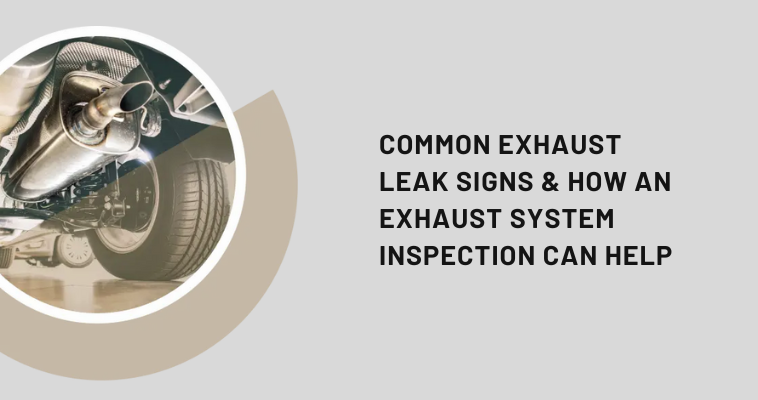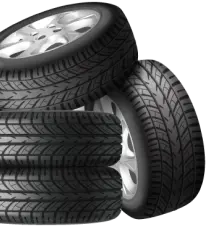A vehicle's exhaust system is important in ensuring engine efficiency, reducing emissions, and maintaining overall performance. Any issue, such as an exhaust leak, can significantly impact fuel efficiency, engine power, and even safety. Identifying exhaust leak signs early and conducting regular exhaust system inspections at the right time can prevent costly repairs and ensure optimal vehicle performance.
In this blog, we will discuss some of the common exhaust leak signs and how inspection can help the exhaust system work.
What are some of the common exhaust leak signs?
Recognising the warning signs of an exhaust system leak can help prevent further damage.
Below are the key indicators of an exhaust leak:
1. Unusual Noises
One of the most common and noticeable signs of an exhaust leak is an increase in engine noise. If you hear a loud rumbling, hissing, or ticking sound, particularly when accelerating, it may indicate a crack, hole, or disconnected section of the exhaust system. The noise typically originates from underneath the vehicle and may become louder as the leak worsens.
A leaking exhaust can also cause a whistling or popping sound, which may indicate an issue with the exhaust manifold or gaskets. These components play an important role in directing exhaust gases away from the engine, and any damage can disrupt their efficiency.
2. Decreased Fuel Efficiency
An exhaust leak can lead to poor engine efficiency, forcing the vehicle to consume more fuel. The engine compensates for the leak by burning more fuel, leading to a noticeable drop in mileage. If you find yourself refuelling more often than usual without a change in driving habits, it could be due to an exhaust system problem.
An exhaust system inspection can determine whether the leak is affecting engine performance and fuel economy, helping to restore optimal efficiency.
3. Strong Exhaust Smell Inside the Cabin
A well-functioning exhaust system should direct gases away from the vehicle's interior. However, if there is a leak, exhaust fumes may enter the cabin, producing a strong, unpleasant smell. This is a significant safety concern, as exhaust gases contain carbon monoxide, a toxic substance that can cause dizziness, headaches, nausea, and, in severe cases, carbon monoxide poisoning.
If you notice an unusual exhaust or burning smell inside your vehicle, it is crucial to get an inspection from a mechanic to prevent potential issues.
4. Reduced Engine Performance
An exhaust system leak can reduce back pressure, which is essential for maintaining optimal engine performance. If the system is compromised, the engine may struggle to maintain power, resulting in sluggish acceleration, reduced speed capabilities, and poor overall performance. Car owners may also experience issues when pressing the accelerator or difficulty maintaining a consistent speed.
In some cases, performance issues caused by exhaust leaks can be made worse by old or degraded engine oil. When the engine isn't properly lubricated, it works harder under strain, which can amplify the effects of an already compromised exhaust system. Alongside an exhaust system inspection, an engine oil change may be necessary to restore smoother and more efficient engine function.
5. Visible Damage to the Exhaust System
Regularly inspecting the exhaust pipes for visible rust, cracks, or holes can help detect leaks early. Corrosion and physical damage can weaken the exhaust system, leading to leaks that impact performance and safety.
Rust is a common issue, especially in areas with high humidity or exposure to road salt. If left unchecked, it can cause the metal components to deteriorate, resulting in exhaust leaks.
6. Check Engine Light Activation
Modern vehicles are equipped with sensors that monitor exhaust system performance. If the check engine light turns on, it could indicate an issue related to the exhaust system, such as a leak, a faulty oxygen sensor, or a catalytic converter problem.
A diagnostic scan by a mechanic can help identify issues accurately. For example, if you drive a prestige vehicle like a Mercedes, visiting a Mercedes mechanic near you makes it easier to assess whether an exhaust leak is the cause and to recommend suitable repairs.
How can an exhaust system inspection help?
Here’s how an inspection can be beneficial:
1. Detects Early Signs of Wear and Tear
Experienced mechanics have the understanding and tools to identify minor exhaust system issues before they become major problems. Detecting early signs of wear and tear can save money on costly repairs and extend the lifespan of the exhaust system.
Scheduling periodic inspections with a mechanic ensures that all components, including the exhaust manifold, catalytic converter, and muffler, are in good condition.
2. Prevents Dangerous Carbon Monoxide Exposure
An exhaust system inspection ensures that there are no leaks allowing harmful gases, such as carbon monoxide, to enter the cabin. Since carbon monoxide is odourless and colourless, it can be difficult to detect without proper inspection.
Protecting passengers from potential carbon monoxide poisoning is a critical reason to have an exhaust system checked regularly.
3. Improves Fuel Efficiency
A well-maintained exhaust system allows the engine to operate efficiently, optimising fuel consumption. Fixing leaks and addressing inefficiencies can improve fuel economy and reduce unnecessary fuel expenses.
4. Enhances Vehicle Performance
A properly functioning exhaust system contributes to optimal engine power and responsiveness. Ensuring the system is in good condition allows for smoother acceleration and a more enjoyable driving experience.
By preventing exhaust leaks, an inspection helps maintain the balance between the air and fuel mixture, essential for consistent performance.
5. Ensures Compliance with Emission Standards
A faulty exhaust system can cause excessive emissions, potentially leading to a failed emissions test. Regular inspections ensure that the vehicle meets environmental regulations and avoids fines or restrictions.
For vehicles required to pass emissions testing, an exhaust system inspection can identify any issues that need to be addressed before testing.
6. Extends the Lifespan of the Exhaust System
Regular maintenance and inspections by an experienced mechanic for car repair in Melbourne can prolong the lifespan of the exhaust system. Preventing excessive wear and addressing minor issues early helps ensure long-term durability and reliability.
Why Choose an Experienced Mechanic at BCS Workshop?
Choosing the right workshop matters at the BCS Workshop in Melbourne, where experienced mechanics have an understanding of European vehicles, including Mercedes, Audi, BMW, and more. Our mechanics use advanced diagnostic tools and offer solutions for complex exhaust issues according to make and model.
Whether you're noticing performance drops or suspect an exhaust leak, the team at BCS Workshop provides thorough inspections and repairs. With an experienced mechanic who can do car repair in Melbourne, you're always assured of quality service.
Take Away
If you experience engine noise, reduced mileage, or unusual smells, contact our car mechanic near you. An adequately functioning exhaust system is essential for vehicle performance, fuel economy, and car owners' safety. By identifying exhaust leak signs early and scheduling regular exhaust system inspections, you can avoid costly damage and maintain regulatory compliance.
Consider booking an inspection with BCS Workshop—for car repair and European vehicle servicing. Regular inspections today can save you from major repairs tomorrow









